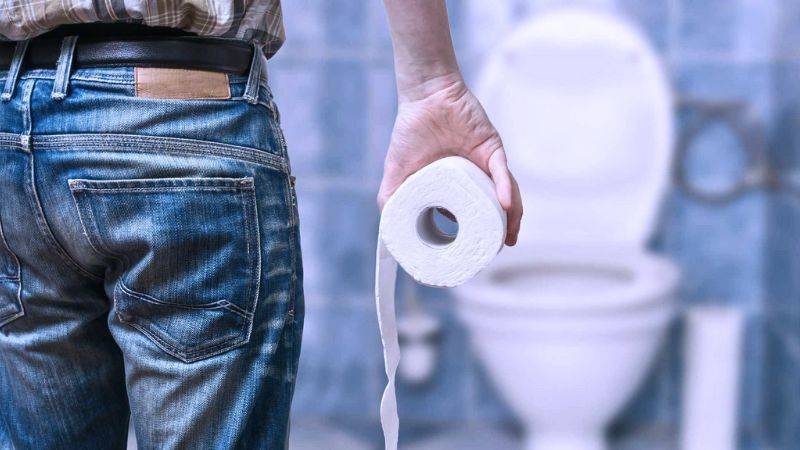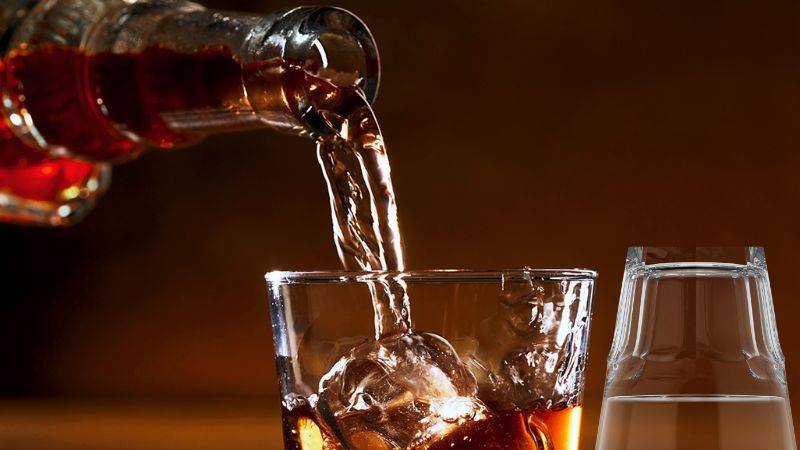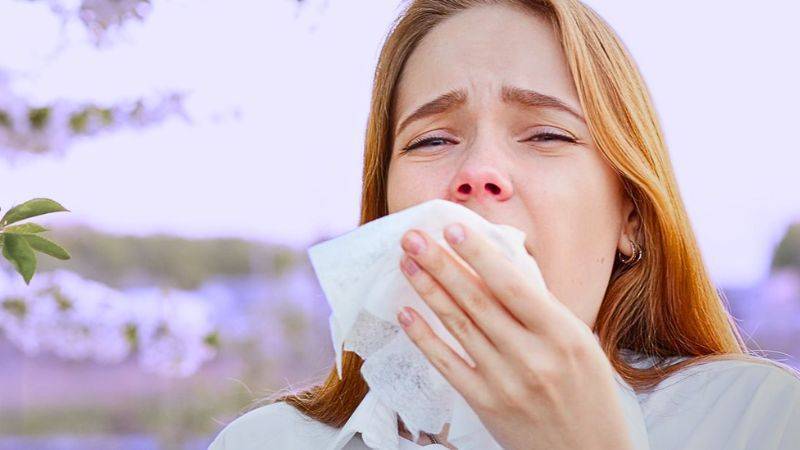Overview
Alcohol is a common part of many social gatherings and occasions. It’s an accepted and, for some, an integral part of celebrating achievements, bonding with friends, or simply unwinding after a hard day at work.
But it’s equally important to acknowledge that excessive or even moderate alcohol consumption can lead to various health complications, one of which is alcohol-induced diarrhea.
Drinking alcohol can make your body digest food faster, which means your colon doesn’t take in as much water. This can cause diarrhea, especially in people with certain health conditions.
But fret not, understanding why it occurs and how to curb it can save you from unnecessary discomfort.
Common Warning Signs of Diarrhea

Diarrhea refers to loose, watery, and frequently occurring bowel movements. It can be accompanied by a variety of signs and symptoms, including:
Loose or Watery Stools: The most obvious sign of diarrhea is a significant change in stool consistency, becoming loose or watery.
Increased Frequency of Bowel Movements: People with diarrhea typically need to go to the bathroom more frequently than usual.
Urgency: A feeling of needing to get to a bathroom quickly is common with diarrhea.
Abdominal Cramps or Pain: The digestive system’s increased activity can lead to discomfort or cramping in the abdomen.
Bloating: Diarrhea can cause a feeling of bloating or fullness in the belly.
Nausea: Some people may feel nauseous when experiencing diarrhea.
In more severe cases, diarrhea can be accompanied by additional symptoms such as:
- Fever
- Blood or Mucus in Stools
- Weight Loss
- Dehydration Symptoms: These may include thirst, dry mouth, tiredness, reduced urination, lightheadedness, and in severe cases, confusion and sunken eyes.
If diarrhea persists for more than a few days or is accompanied by severe symptoms like high fever, blood in stools, signs of dehydration, or significant weight loss, it’s important to seek medical attention.
Causes of Diarrhea after drinking Alcohol
Diarrhea after drinking alcohol can result from several factors, including:
1. Increased Gastric Acid Production: Alcohol stimulates your stomach to produce more acid than usual, which can irritate your stomach lining and lead to digestive issues.
2. Altered Gut Motility: Alcohol can speed up digestion, meaning that food passes more quickly through your system. This doesn’t allow your colon to absorb as much water, leading to looser stools.
3. Dehydration: Alcohol is a diuretic, which means it can lead to increased urine production and potentially cause dehydration. This, in turn, can affect bowel movements and may cause diarrhea.
4. Altered Gut Microflora: Alcohol can disturb the balance of bacteria in your gut, which plays a crucial role in maintaining gut health. Disruption in this balance can lead to gastrointestinal issues.
5. Alcohol Intolerance: Some people might have an intolerance or sensitivity to alcohol or ingredients in alcoholic drinks, such as gluten or other grains, which can cause diarrhea.
6. Existing Gastrointestinal Conditions: For those with pre-existing digestive disorders like irritable bowel syndrome (IBS), inflammatory bowel disease (IBD), or gastritis, alcohol can exacerbate symptoms, including diarrhea.
Remember that while moderate alcohol consumption might be acceptable for some, it’s always important to listen to your body.
If you consistently experience diarrhea after drinking alcohol, it may be a sign you need to cut back or seek medical advice.
Greater Risk of Experiencing Diarrhea After Alcohol Consumption
Some people are more likely to get diarrhea after drinking alcohol. These include:
- People with Alcohol Intolerance: Their bodies react poorly to alcohol, which can cause diarrhea.
- People with IBS or IBD: Alcohol can make their symptoms, like diarrhea, worse.
- People with Celiac Disease or Gluten Sensitivity: Some alcoholic drinks have gluten, which can cause diarrhea in these individuals.
- People with Chronic Pancreatitis or Gastritis: Alcohol can worsen these conditions and cause diarrhea.
- People Allergic to Certain Drink Ingredients: Some may be allergic to things like sulfites in certain drinks, leading to digestive issues.
If you often get diarrhea after drinking alcohol, it might be a good idea to talk to a doctor to see if there’s an underlying reason.
Can You Treat Alcohol-induced Diarrhea at Home?
If you find yourself with diarrhea from drinking alcohol, the best first step is to stop drinking. Hold off on any alcohol until your digestion gets back to normal. When you start drinking again, be mindful that the diarrhea might come back.
By not drinking, most diarrhea caused by alcohol will get better within a few days. You can also do a few things to help relieve your symptoms.
What should you eat and drink?
Choose foods that are easy on your stomach. Some good options are:
- Plain crackers
- Toast
- Bananas
- Eggs
- Rice
- Chicken
Drink plenty of clear liquids, like water, broth, and juice, to help replace the fluids you lost when you had diarrhea.
What should you avoid?
Try not to drink anything with caffeine, as it can make diarrhea worse.
Steer clear of these foods:
- Foods high in fiber, like whole-grain breads and cereals
- Dairy products like milk and ice cream (yogurt is usually okay)
- Foods high in fat, like beef or cheese
- Foods with a lot of spices or seasoning, like curries
Are there any over-the-counter treatments?
You can use over-the-counter medicines for diarrhea if you need to, like Imodium A-D or Pepto-Bismol.
You might also want to try probiotics, which you can get in pill or liquid form. Ask your doctor about the right amount for you.
Probiotics can also be found in some foods, like yogurt, sauerkraut, and kimchi.
Does Drinking too much Alcohol cause any Long-term Problems?
Yes, chronic heavy drinking can lead to a number of long-term health problems, some of which are:
1. Liver Disease: Heavy drinking can cause alcoholic hepatitis, cirrhosis, and other liver-related problems. The liver is responsible for processing alcohol, but an overload can lead to inflammation and scarring (cirrhosis), which can be life-threatening.
2. Cardiovascular Problems: Regular heavy drinking can lead to high blood pressure, heart disease, stroke, and other heart-related issues.
3. Digestive Problems: Alcohol can cause a range of digestive problems, from gastritis and ulcers to pancreatitis and malnutrition due to impaired nutrient absorption.
4. Neurological Complications: Excessive alcohol use can cause neurological issues, including peripheral neuropathy and dementia. It can also increase the risk of mental health disorders, such as depression and anxiety.
5. Increased Risk of Cancer: Long-term heavy drinking increases the risk of several types of cancer, including mouth, throat, esophagus, liver, colon, and breast cancer.
6. Alcohol Use Disorder (AUD): This is perhaps the most direct long-term effect of chronic heavy drinking. AUD is a chronic relapsing brain disease characterized by an impaired ability to stop or control alcohol use despite adverse social, occupational, or health consequences.
When is it Time to Visit a Doctor?
Usually, diarrhea that comes after drinking alcohol gets better with a few days of home care.
But, if diarrhea is very bad or doesn’t go away, it can lead to dehydration, which can be very dangerous if it’s not treated. Signs of dehydration include:
- being very thirsty
- having a dry mouth and skin
- not peeing much, or at all
- not peeing often
- feeling very weak
- feeling dizzy
- feeling tired
- feeling lightheaded
- having dark yellow pee
You should go to the doctor if you’re showing signs of dehydration and:
- Your diarrhea hasn’t gotten better after two days.
- You have really bad stomach or bottom pain.
- Your poop is bloody or black.
- You have a fever over 102˚F (39˚C).
If you often get diarrhea after you drink alcohol, it might be a good idea to think about your drinking habits.
It’s good to know how to handle diarrhea after drinking alcohol because then you’ll know how to deal with it.
In a Nutshell
Diarrhea can be a serious issue that comes from drinking too much alcohol. It depends on the amount you drink and how your body handles it.
The body’s processing of alcohol can lead to diarrhea. You should take steps to avoid this when drinking. If the problem persists for a few days, see a doctor.
Also, remember to drink plenty of water when you have alcohol to prevent dehydration. This is key to avoiding diarrhea.
Take Care of Yourself!
Also Read






